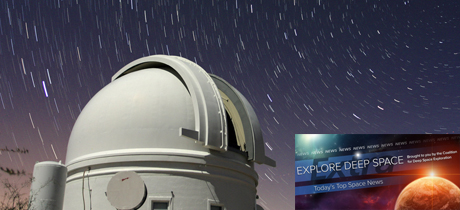In Today’s Deep Space Extra… Chicago astronomer to settle at the U.S. Library of Congress for a yearlong look at the ethical considerations for the human exploration of Mars.
Human Space Exploration
The ethics of Mars exploration: Q&A with Lucianne Walkowicz
Space.com (8/2): Recently named the Library of Congress’ Baruch S. Blumberg Chair in Astrobiology, Lucianne Walkowicz will spend a year in Washington exploring the rationale and ethics for the human exploration of Mars. Some themes include the soundness of the Outer Space Policy and moving ahead on deep space exploration with inclusiveness.
Trump says U.S. will return to moon, now he has to make it happen
The Hill (8/2): Citing recent remarks by Vice President Mike Pence, an op-ed urges President Trump to move swiftly to enable NASA and the U.S. commercial sector to ally to return human explorers to the lunar surface and eventually to Mars. Pence chairs the recently re-established White House National Space Council. “The right words have been spoken. It is time for them to be followed by deeds,” writes Mark Whittington in the op-ed.
Space Science
The loyal engineers steering NASA’s Voyager probes across the universe
New York Times (8/3): On Aug. 20 and Sept. 5, NASA will mark the 40th anniversaries of the Voyager 2 and 1 launches. Still exploring beyond the solar system, the two planetary science missions provided close-ups of Jupiter, Saturn, Neptune and Uranus and some of the solar system’s most interesting moons.
NASA is hiring a ‘planetary protection officer’ to guard us against alien life and vice versa
Washington Post (8/2): The choice for a three to five year appointment as NASA’s planetary protection officer will work to prevent terrestrial contaminants from gaining a foothold on Mars and other planetary destinations that may host some form of life. And they will work to ensure that samples from those destinations that return to Earth are handled so that they do not contaminate the home planet.
As eclipse watchers look to the sky, a new age of telescopes is dawning
Time (8/1): A rare total solar eclipse on Aug. 21 is spurring discussion about telescopes and emerging astronomical observatories, both space and Earth based. Examples including the James Webb Space Telescope will focus on the earliest star systems and search for bio markers in the atmospheres of exo-planets. The Transiting Exoplanet Survey Satellite will look to the closest stars for signs of Earth-like planets.
August total solar eclipse gives scientists rare chance to study sun’s corona
Washington Post (8/2): Scientists gathered in Kentucky for the Aug. 21 total solar eclipse on behalf of the National Science Foundation will take flight for a rare chance to study the sun’s corona, or dynamic outer atmosphere.
Other News
Spacepolicyonline.com (8/3): Russian sanctions, outlined in legislation passed in the U.S. House and Senate by wide margins this summer, were signed into law by President Trump, who professed reluctance, on Wednesday. Activities involving NASA and U.S. commercial space activities and Russia, however, are exempt. The legislation cites Russian activities in Ukraine and undermining cyber security. Russia currently provides the only transportation to and from the International Space Station for astronauts and is a supplier of rocket engines to U.S. aerospace companies.
Lockheed Martin begins building $350 million satellite facility in Jeffco
Denver Business Journal (8/2): Lockheed Martin has started construction of a 266,000 square foot Gateway Center satellite plant. The $350 million facility is scheduled for completion in 2020. 3-D printing capabilities are among the innovations planned for the new production center.
Virgin Orbit plans 2018 first launch
Space News (8/2): The Virgin Galactic spin off Virgin Orbit plans the first of its small vehicle launches during the first half of 2018. Cosmic Girl, a converted Boeing 747, will serve as the carrier aircraft.

